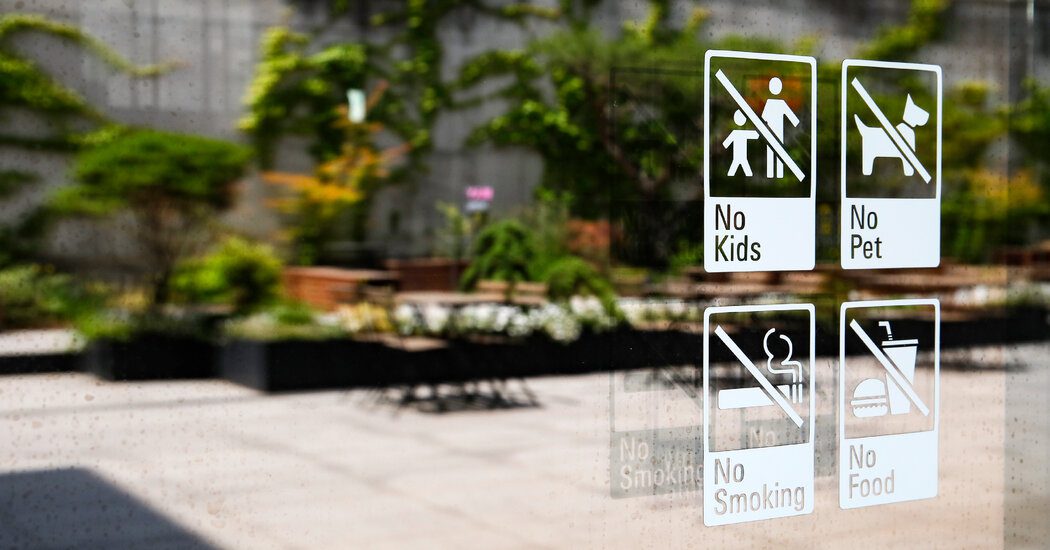Global Courant 2023-05-16 13:03:37
SEOUL – South Korea has the lowest birth rate in the world, but parents say the government is not making it easier for them to have children now that hundreds of public facilities across the country have been designated “no-child zones.”
Earlier this month, a lawmaker took her toddler to the National Assembly and called on the government to ban the policy, which would allow restaurants, museums, cafes and other establishments to deny children access.
In her speech, Yong Hye-in, a representative of the Basic Income Party, said it is becoming more difficult to raise a family in cities that ban children from certain areas. Eliminating child-free zones and creating a society that accepts more children would help the country overcome its low birth rate, she said.
“Life with a child is not easy,” said Ms. Yong holding her son during the National Assembly. “But we still need to create a society where we can live together with our children.”
Last year, South Korea had one birth rate of 0.78according to government figures. Many young couples in the country are choosing not to have children because of the rising costs of childcare and housing, job shortages and growing concerns about the future. For years, the government has offered incentives, such as monthly grants worth hundreds of dollars to families with children, but has failed to adequately address the demographic crisis.
There are hundreds of no-kid zones all over South Korea. For example, the National Library of Korea prohibits anyone under the age of 16 from entering without special permission. (Recently, some places have also tried to ban senior citizens, spark a debate online.)
This is the second time that Ms. Yong has appeared at the National Assembly with her child. In the summer of 2021 she came with her son when he was only a few weeks old. The National Assembly prohibits entry from anyone except assembly members and authorized personnel, and itself is considered a no-child zone.
Ms. Yong introduced the “National Assembly Chamber Child Companion Law” in 2021, calling for babies under 24 months to be allowed access to the main floor of the legislature. The bill has yet to pass.
The debate over where children should and shouldn’t be admitted has been going on for years, and not just in South Korea. Angry travelers have often asked why airlines are not introducing seating areas for families with small children.
Several countries, including Australia and the United States, allow children to enter government buildings. Babies were first allowed on the Washington Senate floor after Senator Tammy Duckworth, whose presence was needed to confirm a new NASA administrator, gave birth to a daughter less than two weeks before the 2018 vote.
Stella Creasy, a member of the British Parliament, was punished in 2021 for taking her baby to Westminster Hall in London.
Ms. Yong was born in 1990 in Bucheon, a city on the outskirts of Seoul, and became a legislator in 2020. In addition to abolishing no-kids zones, she also plans to introduce legislation requiring children and their families to queue avoid places such as museums and theme parks.
There are almost 3.5 million children under the age of 10 in South Korea, and more than 11,000 public facilities designed for children’s play, according to government statistics.
Public opinion on child-free zones suggests that most South Koreans support them. a Survey 2022 from Hankook Research, a polling firm based in Seoul, showed that 73 percent of respondents were in favor of no-kid zones, while only 18 percent were against. (Another 9 percent of respondents were undecided).
Proponents of the policy say children can be disruptive to customers. “I usually go to cafes to study, I don’t want to be disturbed by crying children,” Lee Chan-hee, a Seoul engineering student who frequents cafes where children are banned, said in an interview this week.
Other reasons to support the zones include preventing accidents and property damage, as well as injuries to young children. Protecting the rights of small business owners was also a consideration.
But the tide can turn.
The push to get rid of the child-free zones gained momentum last week when the health and welfare commission on Jeju Island – a popular tourist destination off the southern tip of the Korean peninsula – deliberated an ordinance that would see the island-wide child-free zones would abolish. .
Legislators on the island will hold a session later this month to decide whether or not to pass the bill. If passed, it would be the first law of its kind in South Korea.








